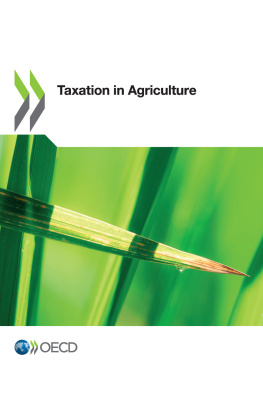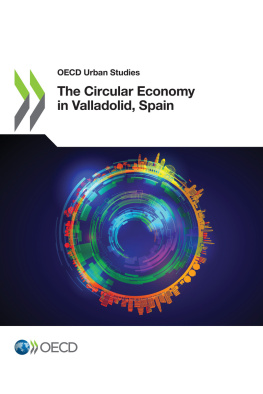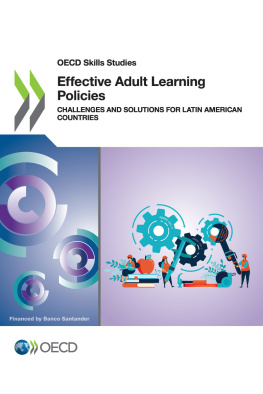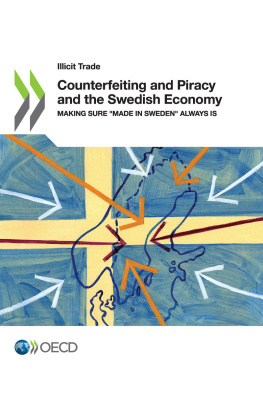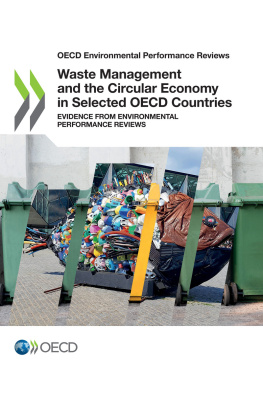OECD - The Sharing and Gig Economy: Effective Taxation of Platform Sellers
Here you can read online OECD - The Sharing and Gig Economy: Effective Taxation of Platform Sellers full text of the book (entire story) in english for free. Download pdf and epub, get meaning, cover and reviews about this ebook. year: 2019, publisher: OECD Publishing, genre: Home and family. Description of the work, (preface) as well as reviews are available. Best literature library LitArk.com created for fans of good reading and offers a wide selection of genres:
Romance novel
Science fiction
Adventure
Detective
Science
History
Home and family
Prose
Art
Politics
Computer
Non-fiction
Religion
Business
Children
Humor
Choose a favorite category and find really read worthwhile books. Enjoy immersion in the world of imagination, feel the emotions of the characters or learn something new for yourself, make an fascinating discovery.
- Book:The Sharing and Gig Economy: Effective Taxation of Platform Sellers
- Author:
- Publisher:OECD Publishing
- Genre:
- Year:2019
- Rating:3 / 5
- Favourites:Add to favourites
- Your mark:
- 60
- 1
- 2
- 3
- 4
- 5
The Sharing and Gig Economy: Effective Taxation of Platform Sellers: summary, description and annotation
We offer to read an annotation, description, summary or preface (depends on what the author of the book "The Sharing and Gig Economy: Effective Taxation of Platform Sellers" wrote himself). If you haven't found the necessary information about the book — write in the comments, we will try to find it.
OECD: author's other books
Who wrote The Sharing and Gig Economy: Effective Taxation of Platform Sellers? Find out the surname, the name of the author of the book and a list of all author's works by series.
The Sharing and Gig Economy: Effective Taxation of Platform Sellers — read online for free the complete book (whole text) full work
Below is the text of the book, divided by pages. System saving the place of the last page read, allows you to conveniently read the book "The Sharing and Gig Economy: Effective Taxation of Platform Sellers" online for free, without having to search again every time where you left off. Put a bookmark, and you can go to the page where you finished reading at any time.
Font size:
Interval:
Bookmark:

OECD (2019), The Sharing and Gig Economy: Effective Taxation of Platform Sellers : Forum on Tax Administration , OECD Publishing, Paris.
https://doi.org/10.1787/574b61f8-en
The development of the sharing and gig economy, facilitated by online platforms, can have a positive impact on our economies. It provides new opportunities to share assets, increase efficiency, lower prices and offers better services and more choice for both suppliers and consumers.
From the perspective of tax administrations it also raises a number of challenges and opportunities: on the one hand certain new activities may not always be visible to tax administrations or self-reported by taxpayers; on the other hand, technological developments can lead to greater transparency and support simplification of tax obligations if leveraged in the right way. The benefits of this approach is that activities are brought back into the tax system with minimum burden on taxpayers and administrations alike.
The report demonstrates that the effective taxation of the users of sharing and gig economy platforms is an issue that many tax administrations are grappling with and that, regardless of any action taken domestically, strengthened international cooperation is key to making these measures successful.
There are no simple solutions to this issue and this report sets out a range of areas that the international community could consider taking forward to build on the close engagement that has already taken place. Areas flagged in the report for further consideration are: exploring the need for administrations and platforms to educate taxpayers to build awareness of their obligations; the possible development, in collaboration with platforms, of a voluntary code of conduct to include expectations on taxpayer education; and the exchange of information between tax jurisdictions in a standardized way.
We believe that the report will assist in the development of legislative models for standardized reporting by sharing and gig economy platforms and will provide valuable information and insights to tax administrations and taxpayers, contributing to enhance mutual understanding and trust.
We would like to thank the FTA Bureau and the OECD Secretariat for their support as well as the project team from United Kingdom and Italy for their collaborative work on the preparation of this informative report. Our gratitude also goes to everyone who has been involved in producing the report, in particular the teams in the participating tax administrations that have contributed their time and expertise, FTA countries that responded to the requests for information as well as platforms that provided evidence and insights.
Jim Harra
(HMRC's Deputy Chief Executive)
Paolo Valerio Barbantini
(Agenzia delle entrate Deputy Director General)
At the 2017 11th Plenary meeting of the OECD Forum on Tax Administration (FTA) in Oslo, FTA members agreed to work collaboratively on a project to help ensure the effective taxation of those earning income from the sale of goods or services in the sharing and gig economy (also known as the collaborative economy) .
A project group, led by the Italian Revenue Agency and the United Kingdoms Her Majestys Revenue and Customs, was set-up to carry out the work. The project group held several meetings and the project leads engaged with selected sharing and gig economy platform operators.
This report summarises the finding of the project group. It is divided into four chapters:
Chapter 1 sets out the background to the sharing and gig economy and the role of online platforms;
Chapter 2 provides some examples of current approaches that are being taken by FTA tax administrations that participated in this work;
Chapter 3 sets out a range of options that tax administrations may wish to consider to help enable compliance in this sector; and
Chapter 4 sets out recommendations and considerations for possible further work.
While the aim of the project was to help ensure the effective taxation of platform sellers in the sharing and gig economy, project participants acknowledged that this should be done in a way that does not place unnecessary burdens on platform sellers, the sharing and gig economy platforms or tax administrations. These principles are reflected in the recommendations made.
This report was approved by the Committee on Fiscal Affairs on 6 March 2019 and prepared for publication by the OECD Secretariat.
Tax administrations operate in varied environments, and the way in which they each administer their taxation system differs in respect to their policy and legislative environment and their administrative practice and culture. As such, a standard approach to tax administration may be neither practical nor desirable in a particular instance. Therefore, this report and the observations it makes need to be interpreted with this in mind. Care should be taken when considering a countrys practices to fully appreciate the complex factors that have shaped a particular approach. Similarly, regard needs to be had to the distinct challenges and priorities each administration is managing.
Font size:
Interval:
Bookmark:
Similar books «The Sharing and Gig Economy: Effective Taxation of Platform Sellers»
Look at similar books to The Sharing and Gig Economy: Effective Taxation of Platform Sellers. We have selected literature similar in name and meaning in the hope of providing readers with more options to find new, interesting, not yet read works.
Discussion, reviews of the book The Sharing and Gig Economy: Effective Taxation of Platform Sellers and just readers' own opinions. Leave your comments, write what you think about the work, its meaning or the main characters. Specify what exactly you liked and what you didn't like, and why you think so.








